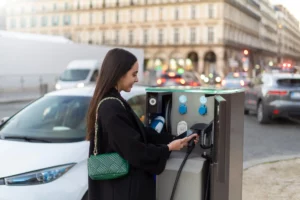
Home / EV Charging News / Electric Car Charging Infrastructure Funding and Investment
The expansion of electric vehicle (EV) charging infrastructure is essential for the widespread adoption of electric cars. This article explores the sources of funding and investment for expanding EV charging infrastructure, highlighting the role of public-private partnerships in financing charging network expansion.
As the popularity of electric vehicles continues to rise, there is a pressing need to expand charging infrastructure to meet the growing demand. Without adequate charging infrastructure, EV adoption may be hindered, limiting the transition to sustainable transportation.
Expanding EV charging infrastructure is crucial for supporting long-distance travel and alleviating range anxiety among electric car owners. High-speed charging stations along major highways and interstates are essential for enabling convenient and efficient travel for EV drivers.
Government agencies at the federal, state, and local levels often provide grants and subsidies to support the deployment of EV charging infrastructure. These funds may be allocated for the installation of public charging stations, tax incentives for charging station operators, or research and development in charging technology.
Private investors, including venture capital firms, energy companies, and infrastructure developers, play a significant role in funding EV charging infrastructure projects. These investors recognize the growth potential of the electric vehicle market and seek opportunities to invest in charging network expansion.
Electric utilities may offer incentive programs to encourage the installation of EV charging infrastructure. These programs may include rebates for installing charging stations, discounted electricity rates for EV charging, or partnerships with charging network operators to deploy charging infrastructure.
Public-private partnerships (PPPs) leverage the resources and expertise of both public and private sectors to finance and deploy EV charging infrastructure. By combining government funding with private investment, PPPs can accelerate the expansion of charging networks and overcome financial barriers.
PPPs distribute risks and rewards between public and private partners, ensuring that investments are aligned with the interests of both parties. Public entities provide regulatory support, access to public land, and long-term revenue guarantees, while private investors contribute capital, project management expertise, and operational efficiency.
PPPs foster innovation in EV charging technology and business models by incentivizing collaboration between public agencies, private companies, and research institutions. By pooling resources and sharing knowledge, PPPs drive the development of advanced charging solutions and improve the efficiency and reliability of charging networks.
Expanding electric car charging infrastructure requires a coordinated effort involving government agencies, private investors, and industry stakeholders. By leveraging a combination of government funding, private investment, and public-private partnerships, the expansion of EV charging infrastructure can be accelerated, enabling widespread adoption of electric vehicles and supporting the transition to sustainable transportation. As funding mechanisms evolve and partnerships strengthen, the future of electric car charging infrastructure looks promising, paving the way for a cleaner, greener, and more sustainable transportation system.
